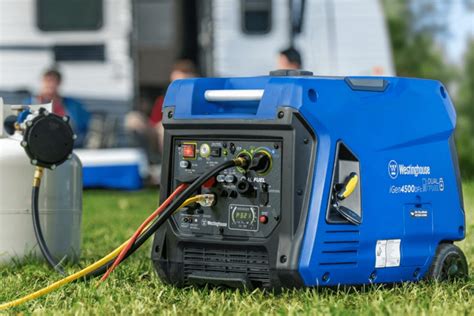Get the Most From Your RV AC: Generator Power
Running your RV air conditioner effectively relies heavily on your generator's capabilities. Understanding the power demands of your AC unit and matching it with your generator's output is crucial for comfortable camping and avoiding frustrating breakdowns. This guide will help you maximize your RV AC's performance while utilizing your generator's power efficiently.
What Size Generator Do I Need to Run My RV AC?
This is the most frequently asked question, and the answer isn't straightforward. The required generator size depends on several factors:
-
AC Unit's BTU Rating: The British Thermal Unit (BTU) rating indicates the cooling capacity of your air conditioner. Higher BTU means more cooling power, but also higher power consumption. Check your AC unit's specifications for its BTU rating and its stated amperage draw.
-
Generator's Running Watts: Don't just look at the stated peak wattage; focus on the running wattage. This is the continuous power your generator can provide. Your AC unit's surge wattage (the initial power draw when it starts) will be higher than its running wattage, so ensure your generator can handle both.
-
Inverter vs. Conventional Generator: Inverter generators are generally more fuel-efficient and quieter, but they may not always provide the surge power needed for larger RV AC units. Conventional generators often offer more raw power but can be noisier and consume more fuel.
-
Other Running Appliances: Remember, your generator powers more than just your AC. Consider the simultaneous use of other appliances like refrigerators, microwaves, and lights. Add their wattage demands to the AC unit's to get a total power consumption figure.
Rule of Thumb: Aim for a generator with running wattage at least 20-30% higher than the total wattage of your AC unit and other simultaneously used appliances. Underestimating can lead to overloading, which can damage your generator or even cause a fire.
How to Reduce AC Power Consumption in Your RV
Even with a powerful generator, conserving energy is key to extending your generator's runtime and preventing overload. Here are some tips:
-
Pre-cool your RV: Before starting the generator and AC, close all windows and shades to trap cooler air inside. This reduces the initial workload on the AC.
-
Maintain proper ventilation: Ensure proper airflow to your AC unit. Clean the vents and filters regularly. Blocked vents reduce efficiency and increase energy consumption.
-
Utilize awnings and reflective window covers: These help keep direct sunlight out, significantly reducing the heat load inside the RV.
-
Use ceiling fans: Ceiling fans help circulate cool air more effectively, potentially allowing you to set your thermostat a few degrees higher without sacrificing comfort.
-
Limit use of other appliances: While the AC is running, try to minimize the use of other power-hungry appliances.
Can I Run My RV AC on a Smaller Generator?
While it's generally not recommended, running your RV AC on a smaller generator might be possible with careful management and energy conservation techniques. However, this often means:
-
Reduced cooling power: The AC unit may not cool effectively, leading to discomfort.
-
Frequent cycling: The generator might struggle to keep up with the AC's power demands, leading to frequent shutdowns and restarts. This puts extra stress on the AC and generator.
-
Shorter generator runtimes: Expect to refuel much more often.
It's crucial to monitor your generator's performance closely when operating under such conditions.
What Happens if I Overload My Generator?
Overloading your generator can lead to several problems, including:
-
Generator shutdown: The generator will automatically shut down to prevent damage.
-
Damaged generator components: Overloading can damage the generator's engine, alternator, or other components.
-
Fire hazard: In severe cases, overloading can cause overheating and potentially lead to a fire.
Always check your generator's manual for specific recommendations on safe operating loads.
How Often Should I Maintain My RV Generator?
Regular maintenance is crucial for optimal performance and longevity. This includes:
-
Regular oil changes: Following the manufacturer's recommended oil change intervals.
-
Spark plug inspection and replacement: Worn spark plugs can reduce efficiency and performance.
-
Air filter cleaning or replacement: A clogged air filter restricts airflow and reduces efficiency.
-
Checking fuel lines and connections: Look for leaks or damage.
By understanding your RV AC's power requirements, your generator's capabilities, and employing energy-saving strategies, you can enjoy comfortable camping trips without worrying about power shortages. Remember to always prioritize safety and consult your generator's manual for specific operating instructions.

